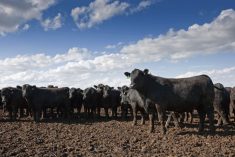Ranchers who display “exemplary” stewardship as tenants on Alberta’s public lands could soon be eligible for double the term of the usual lease.
The province announced Tuesday it expects the new policy to come into effect in late autumn this year and “in the coming months” will release new guidelines on what would be considered “exemplary stewardship.”
Lengthening public land leases to a maximum of 20 years “will allow ranchers to spend more time focusing on their business, and less time dealing with regulatory red tape through lease renewals,” the province said in a release.
Read Also

B.C. ostriches culled, CFIA confirms
Ostriches on an embattled Edgewood, B.C. farm have been culled after a prolonged legal battle, the Canadian Food Inspection Agency has confirmed.
Alberta’s Public Lands Act already allows the province to “lease public land for a term not exceeding 20 years for the purpose of grazing livestock,” or for up to 30 years on “heritage rangeland.”
Today, though, the standard tenure for a grazing lease on Alberta public land is 10 years.
The 20-year-maximum leases, under the new policy, would be granted to ranchers “who show exemplary care for Alberta’s water, land and air resources.”
According to the Alberta Grazing Leaseholders Association, there are about 5,700 grazing leases in Alberta which cover an estimated 5.2 million acres of public land and provide capacity to feed about one million head of livestock.
“Extending grazing tenures for ranchers who go above and beyond our environmental standards recognizes their good behaviour and encourages others to do the same,” provincial Environment Minister Jason Nixon said in a release.
“Ranchers have always been exemplary environmental stewards — it’s good for the health of the environment and for the health of our businesses. It’s nice to see that the government is willing to recognize us for our responsible work,” Alberta Beef Producers executive director Rich Smith said in the province’s release.
The province’s release didn’t offer specific examples of exemplary stewardship, but the environment ministry has had a grazing lease stewardship code of practice in place since 2007, based on four “key rangeland management principles.”
Those principles include:
- balancing livestock demands with the available forage supply;
- promoting even livestock distribution with fencing, salt placement, water development and other tools;
- avoiding grazing during vulnerable periods, such as early spring; and
- providing effective rest periods after grazing, to allow range plants to recover.
The code was signed at the time by Ted Morton, the province’s minister for sustainable resource development, and by representatives from ABP, the AGLA and the Western Stock Growers Association. — Glacier FarmMedia Network
















